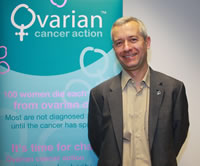Ovarian cancer action appoints new Chief Executive


Ovarian cancer action, the UK’s leading ovarian cancer charity, has appointed Peter Reynolds as Chief Executive. He joins the charity from Children with Leukaemia, where he was Deputy Chief Executive.
Peter brings over twenty years experience of working in the commercial and charity sectors to Ovarian cancer action. Over the past eight years, he has held senior management roles within two organisations with a focus on cancer, Children with Leukaemia and Breakthrough Breast Cancer, where he was the Director of Fundraising and Communications.
He comments on his ambitions for Ovarian cancer action: “Ovarian cancer devastates the lives of thousands of women and their families every year in this country – and survival rates remain shockingly poor. Ovarian cancer action has already made great strides in the fight against the disease and I am looking forward to building on those achievements in the future.”
Ovarian cancer action aims to improve women’s chances of survival through better awareness and world-class research. The charity has made significant progress in ensuring that research into the disease is prioritised and that more women and GPs are aware of the symptoms of the disease.
…ENDS…
Editor’s notes:
o Ovarian cancer action is dedicated to improving survival rates for ovarian cancer through funding research, raising awareness and giving a voice.
o Ovarian cancer is the fourth most common cancer in the UK after breast, lung and bowel. 7,000 women are diagnosed in the UK every year and 12 die every day. UK survival rates have NOT improved in 20 years remaining low at 30%, compared with an increase to 80% for breast cancer. If diagnosed at early stage, women have up to a 95% chance of survival, but alarmingly many women do not know what symptoms to look out for.
o In 2006, the Ovarian Cancer Action Research Centre was opened, which is the first research centre of its kind in the UK. The Centre is a collaboration between Hammersmith Hospital, Imperial College London, The Royal Marsden Hospital and the Institute of Cancer Research and it looks at fundamental biology, early detection and new and improved treatments.



